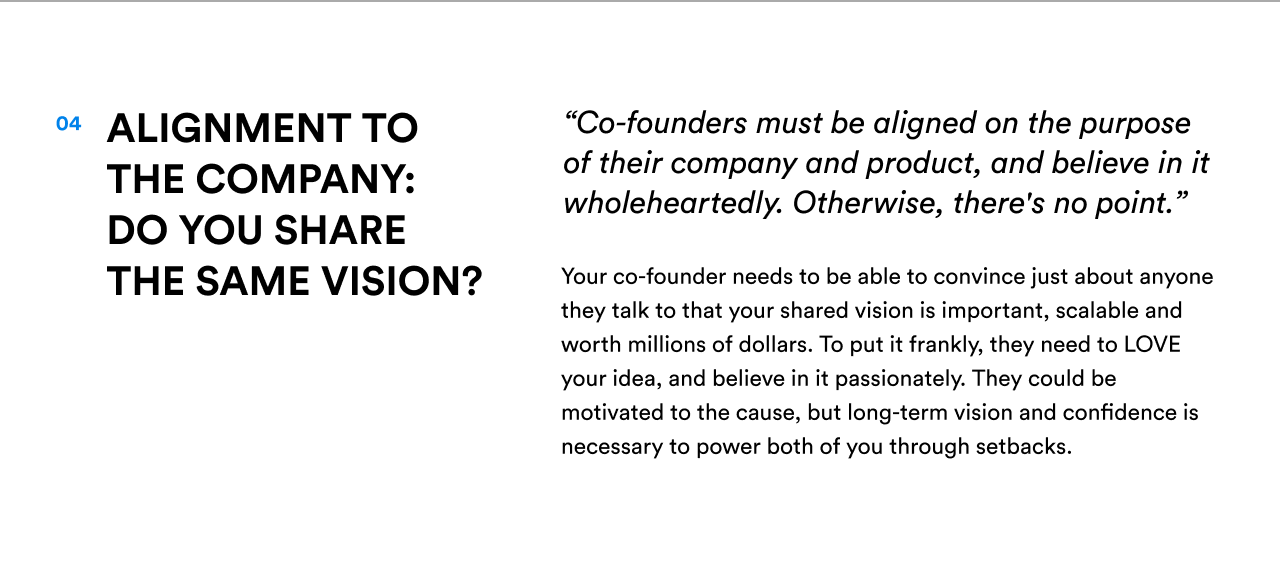Finding the perfect co-founder is a big deal. Whether you’re still mulling over ideas or are further into building your company, you’re searching for the perfect candidate: Someone who’s capable, open to challenges and smart — but at the same time, a decent person you’ll actually enjoy spending basically all of your time with.
Once you’ve narrowed down to your final contenders, think of ways to learn more about their goals, work style, quirks, and grit. We surveyed founders and investors within the Dorm Room Fund network and beyond to learn more about what they look for in an ideal co-founder — which revealed 5 key takeaways:

We collected some of our favorite questions from each of the 5 categories.

How does this help accomplish your life’s purpose?
“I’d ask them this because it would help me understand first, what they want out of life, and second, how our work together will help them achieve their purpose — which would help me learn about their “why,” value system. This will help me understand if they have the same commitment towards working on our idea together.” — Pancham, Berkeley
What role do you expect to play in the company?
“From what I’ve seen, a lot of leadership obstacles can come from a lack of clearly defined roles, delegated tasks, and unclear hierarchy within the founding team.” — Fionce, Seattle
Are you comfortable working on the team for a few months before we have the co-founder discussion?
“All my co-founder struggles have been people wanting the title over doing the work. My current co-founder is someone who is so passionate she worked on our product for 4 months before I even brought up the topic of coming on as a founder. We’ve been working together for more than 2 years since.” — Anum, Los Angeles
Why do you really want to be a founder? Are you ready to give it 100%?
“It’s important to understand how dedicated they are to the startup because when things are rough a founder needs this startup to mean more than a hobby/interest or a side hustle.” — Lillian, San Jose
“Personal reasons matter, especially when things get tough. I want to know why someone is doing it, there is no right answer here but it’s important to be aligned early.” — Lyn, Toronto

How is your skill set complementary to mine?
“Complementary skill sets are important so that our work and roles are separate, and we can cover more of the business between the two of us. It also allows me to be able to trust the co-founders judgment on things that I don’t specifically have expertise on.” — Medha, Berkeley
“It’s important to know that together with your co-founder you are stronger and more effective than you would be if you were alone. The whole should be greater than the sum of the parts.” — Mitch, Boston
How would you try to convince me to do something we don’t agree on?
“Or tackle a situation in which we move forward with something you don’t agree with?” — Aagya, Brooklyn
What is the best piece of feedback you have received?
“I would ask this because actively seeking feedback (from investors, customers, etc.) and responding to it positively is the most important thing a founder can do to grow, and this question would illuminate their mindset.” — Greta, San Francisco

What is your personal burn rate?
“Personal runway matters a lot, especially if you’re someone with student debt or other such factors to consider. It does not make sense to pursue something full-time if you can’t afford to not work.” — Lyn, Toronto
How do you get yourself to do things you aren’t excited about?
“There are certainly a lot of enjoyable aspects about spitballing a product idea and building a business, but it is no secret that there will be hard times and annoying jobs to be done. For any co-founder who I would be spending 80+ hrs/week with, I would want to make sure she thrives in situations where no one is looking.” — Christophe, Ithaca
“What’s your north star? What is it that drives you, what makes you tick?” — Isabel, New York
How long would you be able to work full-time without getting paid by the company?
“This question will highlight his/her dedication, determination, and availability to become a co-founder and assume the responsibilities that it entails, understanding the risk he/she is taking by involving him/her-self as the co-founder of an early stage company.” — Brian, Chicago
How will you make time to work on this company?
“It’s important to know how any potential co-founder manages time and thinks about commitments holistically. Especially in the early stages, co-founders are accountable almost only to each other. I want to know someone will be proactive and prioritize moving things forward without being pushed to do so.” — Kai, New York
How do you manage stress?
“I would ask them about their time and stress management tactics because the startup environment is a stressful one, and one that requires a lot more time than people may initially believe. I would want my co-founder to be able to manage stress and time and help others, including me, do the same throughout our journey.” — Nikita, Fremont
How open are you to change?
“If the company grows, or has to take new directions to grow, it would be important to know how both of us would react.” — Saksham, Los Angeles

Why do you believe our product or service MUST exist?
“I think co-founders must be aligned on the purpose of their company and product, and believe in it wholeheartedly. Otherwise, there’s no point.” — Lola, New York
“Passion is incredibly important for a co-founder; it’ll keep everyone on the same page even if there are disagreements on specific issues, since everyone believes in the same end goal.” — Medha, Berkeley
Why do you care about the problem we are solving and to what extent are you willing to solve this problem?
“Being a repeat entrepreneur I strongly believe the main reasons startups fail is not having the right team to deliver and execute the project nor capital of product market fit. You need people just as motivated as you elevating the team.” — Taran, Calgary
Where do you see yourself in the future?
“I want to know how the candidate’s future goals align with the company’s goals and trajectory. A co-founder is supposed to be a permanent addition to the team.” — Hector, Boston
“Are you willing to give 10 years of your life to working on this? Because it takes at least 10 years for a company to be successful. If they are not, then clearly it’s not a good fit.” — Anant, New Delhi

How do you handle big problems?
“Startups are stressful. There’s daily uncertainty, constant change, and many mistakes. When looking for potential co-founders, I want to know how they handle these big challenges. What are ways they handle issues, how have they dealt with problems before, and how are they problem solvers not creators.” — Peter, Philadelphia
What stand-out experience do you have?
“How much experience in XYZ do you have? Our existing team is young; any potential hires will need to increase investors’ confidence that we’ll ultimately succeed.” — Souvick, Woodbury
Tell me about a time you hacked a non-computer system
“This question, which is obviously one of the famous YC questions definitely gives you more of an insight of what this person has done and the type of methods they take towards hacking something.” — Surya, Cupertino
Written by Mahira Dayal, Head of Content at Dorm Room Fund. Follow her on Twitter. Thanks to Kylie To for graphics, and Jeremy Navarro for survey strategy! Photo by Cytonn Photography on Unsplash
—
Get more Dorm Room Fund news and updates on Twitter and learn more on our website. Want more DRF content? Subscribe to our newsletter and podcast. Ready to take your startup to the next level? Apply here to be considered for an investment from Dorm Room Fund. Until next time! 🚀
